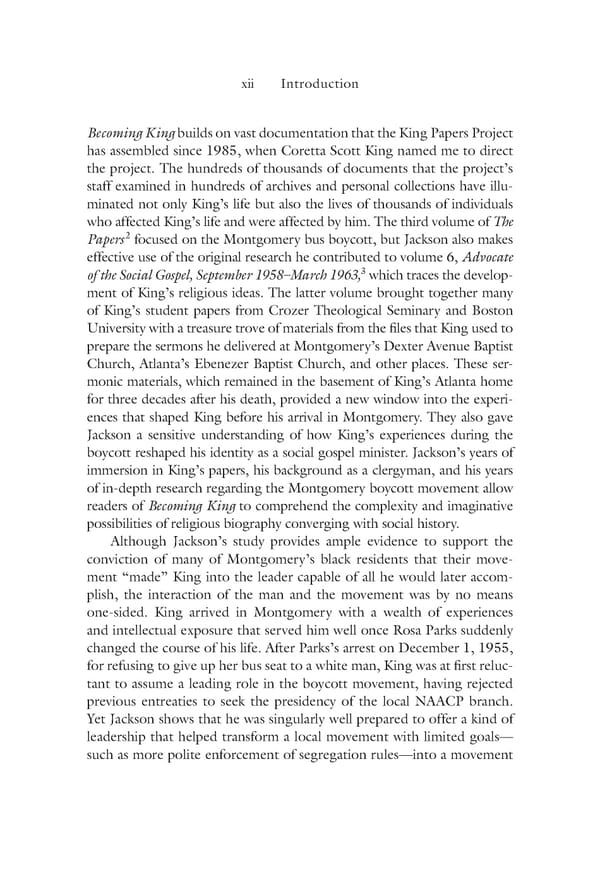xii Introduction Becoming King builds on vast documentation that the King Papers Project has assembled since 1985, when Coretta Scott King named me to direct the project. The hundreds of thousands of documents that the project’s staff examined in hundreds of archives and personal collections have illu- minated not only King’s life but also the lives of thousands of individuals who affected King’s life and were affected by him. The third volume of The 2 Papers focused on the Montgomery bus boycott, but Jackson also makes effective use of the original research he contributed to volume 6, Advocate 3 of the Social Gospel, September 1958–March 1963, which traces the develop- ment of King’s religious ideas. The latter volume brought together many of King’s student papers from Crozer Theological Seminary and Boston University with a treasure trove of materials from the files that King used to prepare the sermons he delivered at Montgomery’s Dexter Avenue Baptist Church, Atlanta’s Ebenezer Baptist Church, and other places. These ser- monic materials, which remained in the basement of King’s Atlanta home for three decades after his death, provided a new window into the experi- ences that shaped King before his arrival in Montgomery. They also gave Jackson a sensitive understanding of how King’s experiences during the boycott reshaped his identity as a social gospel minister. Jackson’s years of immersion in King’s papers, his background as a clergyman, and his years of in-depth research regarding the Montgomery boycott movement allow readers of Becoming King to comprehend the complexity and imaginative possibilities of religious biography converging with social history. Although Jackson’s study provides ample evidence to support the conviction of many of Montgomery’s black residents that their move- ment “made” King into the leader capable of all he would later accom- plish, the interaction of the man and the movement was by no means one-sided. King arrived in Montgomery with a wealth of experiences and intellectual exposure that served him well once Rosa Parks suddenly changed the course of his life. After Parks’s arrest on December 1, 1955, for refusing to give up her bus seat to a white man, King was at first reluc- tant to assume a leading role in the boycott movement, having rejected previous entreaties to seek the presidency of the local NAACP branch. Yet Jackson shows that he was singularly well prepared to offer a kind of leadership that helped transform a local movement with limited goals— such as more polite enforcement of segregation rules—into a movement
 Becoming King: Martin Luther King Jr. Page 12 Page 14
Becoming King: Martin Luther King Jr. Page 12 Page 14